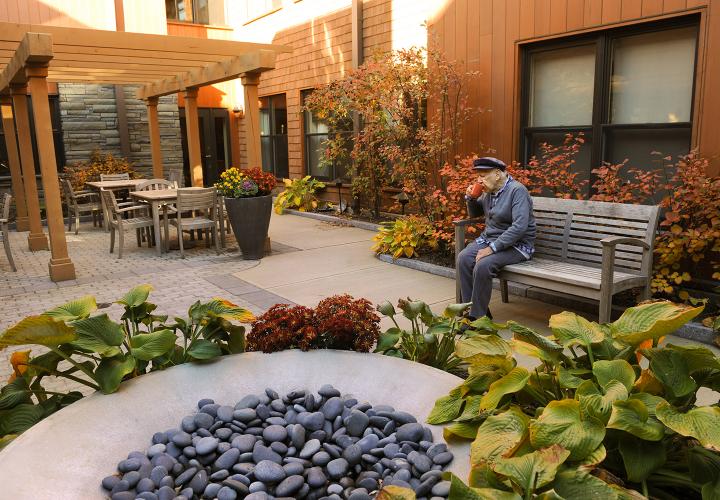Check Out Charlotte Memory Care: Committed to Senior Health and Wellness
Creating a Safe and Supportive Setting: In-Home Memory Care Essentials
Establishing a caring and safe and secure atmosphere for people requiring in-home memory treatment is extremely important to their health and high quality of life. From ensuring safety within the home to using efficient communication techniques and carrying out memory-friendly style aspects, there are important elements that add to an all natural treatment technique. By concentrating on creating a supportive community that provides to the unique needs of those with memory problems, caregivers can dramatically boost the daily experiences of their enjoyed ones.

Safe Living Setting
Producing a safe and hazard-free living environment is vital when providing at home memory take care of people with cognitive disabilities. Making sure the safety and security of the private with amnesia is critical to stop accidents and promote a sense of health. One vital facet of creating a risk-free living atmosphere is to get rid of any type of prospective threats that could cause slides, journeys, or falls. This includes protecting loosened carpets, ensuring sufficient lighting in all locations of the home, and keeping paths clear of mess.
Additionally, making use of innovation such as movement sensing units and alarm systems can alert caretakers if the individual wanders or is in distress. By focusing on security measures and getting rid of potential threats, caregivers can supply a encouraging and safe and secure setting for individuals with cognitive disabilities obtaining in-home memory treatment.
Efficient Interaction Techniques
Implementing customized interaction techniques is essential in cultivating meaningful communications with individuals with cognitive disabilities in the context of at home memory care. Reliable communication plays a critical function in developing a supportive environment that boosts the well-being and lifestyle for people with memory issues. When interacting with somebody experiencing cognitive decline, it is very important to make use of clear and basic language, keep a calm and favorable tone, and supply aesthetic signs to aid comprehension.
One secret method is to practice active listening, showing empathy, persistence, and respect during discussions. Non-verbal hints such as face expressions and body language can additionally help share understanding and assistance. Additionally, utilizing reminiscence therapy by utilizing or talking about past experiences music and art can tap right into lasting memories, boosting and triggering links involvement.
Moreover, incorporating regular regimens and consistent communication patterns can supply a sense of experience and safety for individuals with memory disabilities. By carrying out these interaction methods, caregivers can establish purposeful links and advertise a feeling of comfort and count on in the in-home memory care setting.
Memory-Friendly Layout
Offered the relevance of producing a helpful environment for individuals with memory problems with efficient communication approaches, the unification of memory-friendly style aspects in the space becomes vital in optimizing their day-to-day experiences and general well-being. Memory-friendly layout concentrates read the full info here on enhancing security, convenience, and independence for individuals with cognitive impairments. Straightforward adjustments can make a significant difference, such as utilizing contrasting shades to boost visibility and lower complication, integrating clear signage to assist navigation, and decreasing clutter to prevent sensory overload.
Integrating familiar components from the individual's past, such as individual photos or favored products, can evoke positive memories and develop a sense of experience. Additionally, making certain sufficient lights levels, mounting grab bars in bathrooms, and implementing non-slip flooring can assist stop falls and injuries. Developing a comforting and calming atmosphere via the use of acquainted aromas, soft textures, and relaxed sounds can also advertise leisure and reduce agitation. By incorporating these memory-friendly layout components, caregivers can offer a secure and encouraging space that allows people with memory concerns to keep their independence and lifestyle.
Daily Regimen Planning
When establishing an everyday routine for individuals with memory issues, careful planning is vital to support their cognitive function and general wellness. Establishing a structured schedule can help in reducing complication, disorientation, and anxiety typically experienced by those with memory disabilities. Begin by incorporating familiar activities that align with the individual's passions and preferences. Consistency in everyday routines can give a complacency and stability, helping in the preservation of cognitive capabilities.
Adaptability is key, as some days may need modifications based on the individual's mood and energy levels. Regularly read what he said assessing and adjusting the daily schedule will certainly help ensure its effectiveness in promoting a comforting and favorable environment for people with memory difficulties.
Assistance System Application
Establishing a robust network of supportive individuals plays a critical function in improving the top quality of treatment and wellness for individuals requiring memory assistance. Household participants, friends, healthcare specialists, and area sources can all contribute to developing a solid support group. Interaction among these individuals is important to make certain that the demands of the specific with memory difficulties are met effectively.
Member of the family are often the key caregivers and create the backbone of the support group. They offer daily treatment, emotional assistance, and companionship. When required to prevent exhaustion and make certain the finest feasible care for their liked one., it is crucial for family participants to look for support and reprieve.
In addition to household assistance, involving health care specialists such as registered nurses, therapists, and doctors can give specific treatment and guidance. These experts can supply important understandings, clinical recommendations, and assistance in taking care of the person's problem.

Conclusion
To conclude, producing a risk-free and helpful atmosphere for people with memory treatment requirements is crucial for their health. By developing a safe living environment, using effective communication techniques, integrating memory-friendly style elements, planning daily routines, and implementing a strong support group, caretakers can aid boost the lifestyle for those with memory loss. These vital elements interact to develop a nurturing and encouraging environment that promotes independence and boosts general high quality of life.
Producing a protected and hazard-free living atmosphere is vital when supplying in-home memory treatment for people with cognitive disabilities. By prioritizing safety and security procedures and eliminating potential threats, caretakers can offer a supportive and secure setting for people with cognitive impairments obtaining in-home memory treatment.
Developing a robust network of helpful people plays a critical role in boosting the quality of treatment and wellness for people calling for memory support - Charlotte Memory Care. Interaction among check these people is necessary to ensure that the requirements of the individual with memory obstacles are met properly
